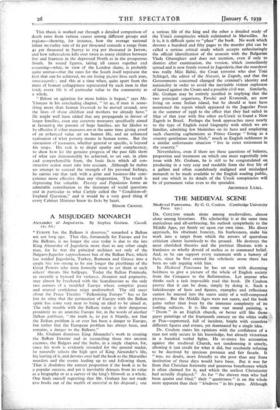A MISJUDGED MONARCH
" EUROPE has the Balkans it deserves," remarked a Balkan wit not long ago. That this, fortunately for Europe and for the Balkans, is no longer the case today is due to the late King Alexander of Jugoslavia more than to any other single man, for he was the principal architect not only of the Bulgaro-Jugoslav rapprochement but of the Balkan Pact, which has welded Jugoslavia, Turkey, Rumania and Greece into a single bloc too strong to be any longer the playthings of the Great Powers who were formerly wont to set them at each others' throats like bullpups. Today the Balkan Peninsula, so recently -a byword for violence, disunion and pugnacity, may almost be bracketed with the Scandinavian as the only two corners of a troubled Europe where complete peace and mutual confidence reign undisturbed. The old sneer about the Peace Treaties " Balkanising Europe " has so far lost its sting that the permeation of Europe with the Balkan spirit has come very near to being an ideal to be aimed at. The only trouble with the Balkans today is their dangerous proximity to an anarchic Europe for, in the words of another Balkan publicist, " the truth is, to put it bluntly, not that the Balkan problem is or ever has been a danger to Europe, but rather that the European problem has always been, and remains, a danger to the Balkans."
Mr. Graham dismisses King Alexander's work in creating the Balkan Entente and in reconciling those two ancient enemies, the Bulgars and the Serbs, in a single chapter, for, since his work is evidently intended for the general reader, he naturally selects the high spot of King Alexander's life, hid leaving of it, and devotes over half the book to the Marseilles murders and the events leading up to and following them. That is doubtless the correct proportion if the book is to be a popular success, and yet it inevitably detracts from its value as a biography or as a survey of the king's lifework as a whole. One fords oneself regretting that Mr. Graham has not made two books out of the wealth of material at his disposal ; one a serious life of the king and the other a detailed study of the Ustgi conspiracies which culminated in Marseilles. As it is, it is difficult quite to "place" the book. No work which devotes a hundred and fifty pages to the murder plot can be called a serious critical study which accepts unhesitatingly the official identification of the assassin with the Bulgarian Vlada Gheorghiev and does not mention, even if only to dismiss after examination, the version, which immediately spread and is now firmly rooted in Jugoslavia, that the murderer was really Mijo Babi6, the Croat terrorist who shot Toni Schlegel, the editor of the Novosti, in Zagreb, and that the Governments concerned changed the criminal's identity and nationality in order to avoid the inevitable violent explosion of hatred against the Croats and a possible civil war. Similarly, Mr. Graham may be entirely justified in implying that the two principal organisers, Pavelie and Kvaternik, are now living on some Italian island, but he should at least have mentioned the report which appeared in the Jugoslav Press in the summer of 1936 to the effect that they had sailed in May of that year with five other ex-Ustagi to found a New Zagreb in Brazil. Perhaps the book approaches most nearly to the type of English royal biography with which we are familiar, admitting few blemishes on its hero and employing such charming euphemisms as Prince George " living as a country gentleman near Nish," much as English noblemen in a similar unfortunate situation " live in strict retirement in the country."
Nevertheless, even if there are these questions of balance, proportion and treatment on which one must regretfully join issue with Mr. Graham, he is still to be congratulated on producing in a very easy and readable form the first life of a gallant and often scandalously maligned and misjudged monarch to be made available to the English reading public, and one which in its details of the Ustah conspiracies will be of permanent value even to the specialist.
ARCHIBALD LYALL.










































 Previous page
Previous page